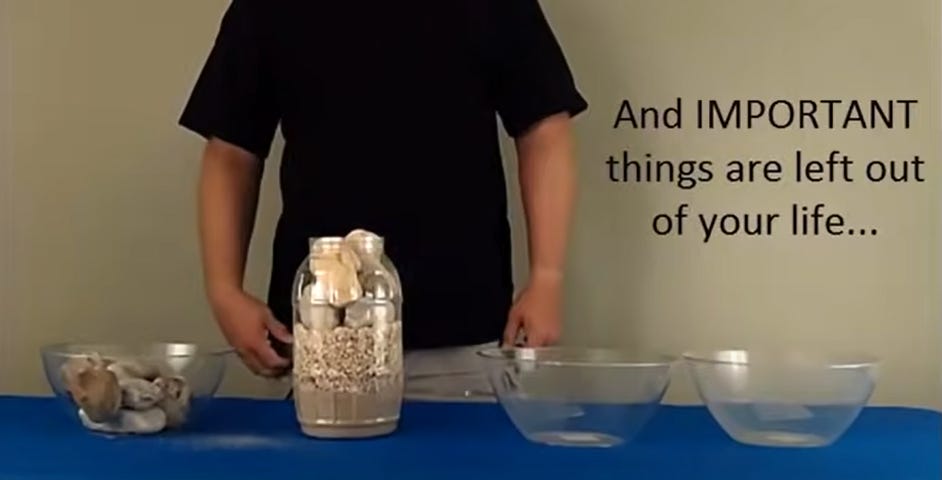Have you ever run out of time, and wished you could have 25 hours a day instead of 24?
Every one of us gets exactly the same amount of time in life: 24 hours, 7 days a week, no more and no less. It’s up to us what we want to do with it.
But how do we make the best use of our time? Last week, we’ve talked about how Eat the Frog helps us get stuff done. Today, let’s take a look at Jar of Life; a neat concept for managing your time and priority.
This week’s ideas are taken from this video by Brian Pray.
We have four things on the table:
Jar, which represents our limited time
Rocks, which represent all the important things. Health, family, study, friends, goals, and doing what you love.
Pebbles, which represent things that quite matter. Work, hobbies, organizations.
Sand, which represents the little things that really don’t matter. Doomscrolling on Twitter, checking out your friends’ stories, trading gossip.
When filling the jar, there are two ways it can go.
The first one, fill the jar (our time) with sand (things that don’t matter), followed by pebbles (work and hobbies), and lastly, rocks (important stuff).
What do you get? The sand and pebbles settle nicely inside the jar, but we have huge chunks of rocks that can’t join the party. Remember that the rocks represent all the important things in your life. What does it tell you?
Now, what if we reverse the process?
Fill the jar with rocks, then pebbles, then sand as the cherry on top. Make time for the important things first. Only after the huge stuff are done with can you squeeze in other secondary agenda.
Now everything fits. You may need to maneuver around the rocks and pebbles, but even if the sand can’t go all the way in, you can just leave it out—it’s not that important anyway.
Jar of Life teaches us to divide our time and priority wisely. If the jar (our time) is filled with sand (trivial, of little importance matter), then we would barely have time for rocks (the important things).
However, if we fill our jar with rocks (the important things), we can still make space for other things that come second.
This concept is also applicable to any situation. For example:
Money management: use your paycheck for important things first (bills, insurance, grocery, emergency fund), then the rest can go for secondary needs (saving, shopping, vacation).
Working on a task: if you have a task due next afternoon, focus on finishing it first. The rocks are the task; the sand is consulting the task with your manager; the sand is scrolling through your social media.
The next time you get sidetracked—feeling compelled to check WhatsApp before starting work, decorating your workspace when you’re supposed to be studying—remember the rocks-pebbles-sand.
So, what are your rocks, pebbles, and sand?
Everyone has different sets of priorities. Yours may look different to your friends, and that’s okay. The key is to arrange them according to your needs.
Thanks for being here, we’ll see you next week. 👋






